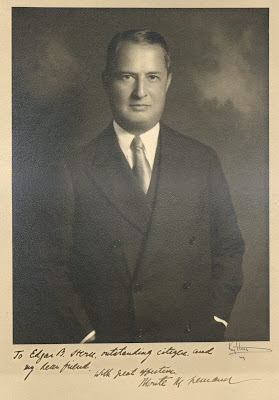LaRC receives the papers of Monte M. Lemann
 |
| Photograph of Monte M. Lemann inscribed "to Edgar B. Stern, outstanding citizen and my dear friend." LaRC preserves Stern's papers. |
Lemann was born in Donaldsonville, Louisiana, the son of Bernard and Harriet Friedheim Lemann. He received a Bachelor of Arts degree from Tulane University in 1902 and a second BA from Harvard in 1903. He then graduated with honors from Harvard Law School in 1906 while also receiving a law degree from Tulane University in 1907.
Lemann returned to New Orleans to join the law firm of Saunders and Gurley. In 1909 he made partner (with the firm becoming Hall, Monroe and Lemann; it became Monroe and Lemann in 1922) and joined the Tulane Law School faculty. From its inception until his death, Lemann served as Chair of the Board of Advisory Editors of the Tulane Law Review Association. In his honor, the Tulane Law School created the Monte M. Lemann Distinguished Teaching Award, which it still presents.
In 1929 Lemann served as president of the Louisiana Bar Association. That same year, President Herbert Hoover appointed him to the National Commission on Law Observance and Enforcement (known unofficially as the Wickersham Commission) established to survey the U.S. criminal justice system under Prohibition. The Commission's report recommended more aggressive law enforcement. Lemann, the youngest member of the commission, refused to sign the report and issued his own, separate opinion, declaring that there was "no alternative but repeal of the [Eighteenth] Amendment."
As a leader of the Louisiana State Law Institute, Lemann played a central role in modernizing Louisiana legal procedures. His special concern for legal aid led him to be a director of both the New Orleans and National Legal Aid Societies, and he was a staunch defender of merit civil service law during its formative years in Louisiana. To this day, the Louisiana Civil Service League presents the Monte M. Lemann Award to individuals outside the classified civil service system who have made major contributions to the advancement of the merit system of public employment in Louisiana.
Personal circumstances compelled him to decline President Roosevelt's offer of a seat on the Court of Appeals for the Fifth Circuit.
Lemann's correspondence reflects his active interest in national legal and political issues. His papers preserve extensive correspondence with his life-long friend U.S. Supreme Court Justice Felix Frankfurter. Active socially, Lemann belonged to the Harvard Club of Louisiana, the Round Table Club, the Country Club, and the West End Club. He also had an interest in in corporate administration, serving as director of the Chalmette Petroleum Corporation, the Louisiana Oxygen Company, the Phoenix Development Company, the Louisiana State Rice Milling Company, the Hunter Canal Company, and others.
In addition to the papers of Monte M. Lemann, the Louisiana Research Collection serves as the larger Lemann Family archives. That includes the papers of the Lemann Family of Donaldsonville and the records of several companies they owned such as the Lemann Company, B. Lemann & Brothers, the Donaldsonville Ice Company, Belle Terre Incorporated, Ascension Hook & Ladder Company, the Palo Alto Company, and the Hotel Donaldson Company. The papers also include the diaries of Bernard Lemann (1841-1899), who was Monte Lemann's father, Jacob Lemann (1809-1877), his grandfather.
The Louisiana Research Collection also serves as the archives for the Jewish community of the Greater New Orleans area. The Lemann Family was an important part of Congregation Bikur Cholim, which worshipped in the second oldest synagogue building in the state in Donaldsonville. And, the Louisiana Research Collection specializes in preserving the social welfare heritage of our state, as reflected by Lemann's interest in legal aid and his position as trustee of the Child Welfare Society.



Comments
Post a Comment